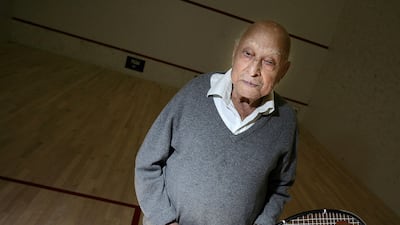Soon, Hashim Khan may no longer be of this world.
Hashim is the first true great of Pakistan squash, the player who kick-started Pakistan’s dominance of the game in the past century.
According to his family, Hashim turned 100 this July, though some accounts could make him as old as 104. He has been unwell for the past few months and spends his days at home in Colorado with round-the-clock care.
It is a disservice to restrict his greatness to within the context of Pakistan, though without him it is reasonable to ask whether the Khan dynasty would have flourished as it did.
When he won the British Open in 1951, he was the first world champion in any sport Pakistan – not quite four years old as an independent country – could claim as its own. That holds permanent significance.
But a fairly reasonable argument could be made that he was the greatest squash player of all time, despite not having played on the international stage until past his physical peak.
He was 37 when he won his first British Open (effectively the world championship of the day).
During the next seven Opens he would lose just once, in the 1957 final to his cousin Roshan. When he beat his younger brother Azam in the following year’s final, his last, he was 44. Had he played on the international circuit in his 20s, there would likely be little doubt about his status.
Until then, he had no real idea as to what standard the rest of the world played. He had been an All-India champion before the partition of the country in 1947, but effectively he played in isolation. He had no idea how he measured up to the outside world until he arrived in England in 1951.
Much of his greatness was established by the manner of his rise. We tend to accept as a matter of course that in countries such as Pakistan, the yet-to-be-discovered athlete’s passion far outstrips his country’s aptitude to organise and harness it. Cricketers, boxers, wrestlers and hockey players generally emerge despite their administration.
Hashim’s story was one of the first of this kind. He really was an untouched, autodidactic genius who could just as easily have remained undiscovered.
He was not professionally trained. He picked up the game because his father Abdullah worked at the Peshawar Club (the cradle of the game in Pakistan), where he eventually became a ball-retriever for armed forces officers who were playing.
That is how he earned a living, in fact, once his father was killed in a car accident.
In his youngest years he played barefoot and only against himself. It was those sessions – Hashim versus Hashim, essentially – where his game developed.
“I stand in back and stroke ball very soft to front,” he recalled in his book Squash Racquets: the Khan Game (it is written deliberately in the style of his speaking).
“True, that other Hashim knows where the ball is going. I cannot keep the secret from him. Still, he runs like a hare to arrive before second bounce. Ah, he succeeds! Now he drives ball hard and it flies to back, to front, to left side, to right side, always running, stroking, running, stroking.”
In these contests, he learnt to beat himself – an essential aspiration in a sport that can be brutal physically and mentally.
His physique was not an aid. Where champions then were long, languid touch players, Hashim was short and dumpy.
When he was young, his shorter stature meant rackets were often too big for him.
He adjusted by gripping it higher up than normal, making up for his lack of height with unparalleled speed and coverage.
Strangely, when seen against the elegant Egyptian style of play and against the strong strain of aesthetics that Pakistan applies to most sports in which it competes, Hashim’s game was not attractive. The fast, endless running, built on vast reserves of stamina, is what defined him, as it did his great successor, Jahangir Khan.
There was no ball Hashim could not retrieve.
Ultimately, he only made it because of the generosity of a few officers in Pakistan’s Air Force.
It was they who clubbed together the money to send him to England (Pakistan had no squash body then).
It was Nur Khan, who would eventually head the Air Force and other sports bodies, who saw Hashim win in England and decided that he would never lack for financial support.
In return Hashim created a legacy, based not on any administrative good sense, but on his feats. His wider family, rather than his country, ruled squash, a reign that lasted until the late 1990s.
He has outlasted it.
osamiuddin@thenational.ae
Follow our sports coverage on Twitter @SprtNationalUAE and Osman Samiuddin @OsmanSamiuddin

